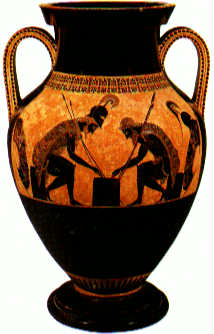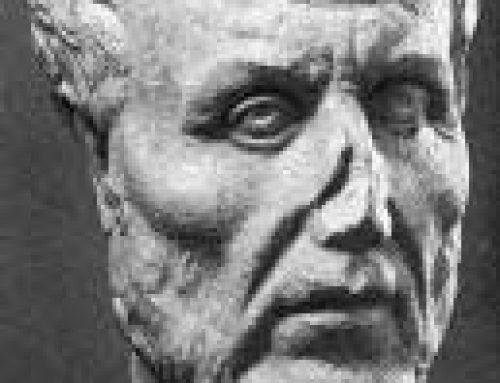
An example of an agon: Black-figure amphora by Exekias showing Achilles and Ajax playing checkers
What is an agon?
The word agon in Greek is the root of our word “agony”, and it means a fight. The Greeks tended to see pretty much everything that happened as a fight between two sides, even things that seem to us like they only have one side.
More about Greek philosophy
All our Ancient Greece articles
Example of an agon
Memorizing your lines for the play, for instance, is an agon, a fight, between you and the play. Getting up in the morning when you are tired is an agon between your nomos and your physis (or an agon between your desire to do well in school and your desire to watch late-night television).
What are nomos and physis?
The struggle not to eat that cookie is an agon. But a war is also an agon, and a game of checkers, and a court case, and courtship is an agon where one person tries to win the other one’s heart.
Greek war and fighting
Olympics and Greek games
Greek courts and judges
Friendship in ancient Greece

Achilles kills Penthesileia just at the moment that they fall in love (Athens, ca. 540 BC)
Greek language and agon
Even in ordinary conversation, the Greek language puts a fight into nearly every sentence. In Greek, “I went to the story, but he stayed home,” is set up as an agon between the two opposing parts of the sentence.
Greek stories involving agons
Practically all Greek stories involve an agon in some way. But the story of Atreus and Thyestes is a good example, or the story of Achilles and Penthesileia.
Learn by doing: hold your own Olympic games
More about Greek philosophy
Bibliography and further reading about “agon” and its role in Greek thought:
Philosophy and Science in Ancient Greece: The Pursuit of Knowledge, by Don Nardo (2004). For teenagers. Don Nardo has written many books for young people about the ancient Greeks.
The Cambridge Companion to Greek and Roman Philosophy, edited by David Sedley (1997).
Homo Necans: The Anthropology of Ancient Greek Sacrificial Ritual and Myth, by Walter Burkert (1987). (Homo Necans means Man the Killer). Burkert is one of the great experts in Greek religion.





Was there a person in Greek mythology named Agon whose qualities came to symbolize how best to handle agony?
Not really? Agon is a Greek word for a fight (not agony). But sometimes Agon was personified – imagined as a person – so people could pray to that imaginary person. In particular, there was an altar to Agon at the Olympic Games.